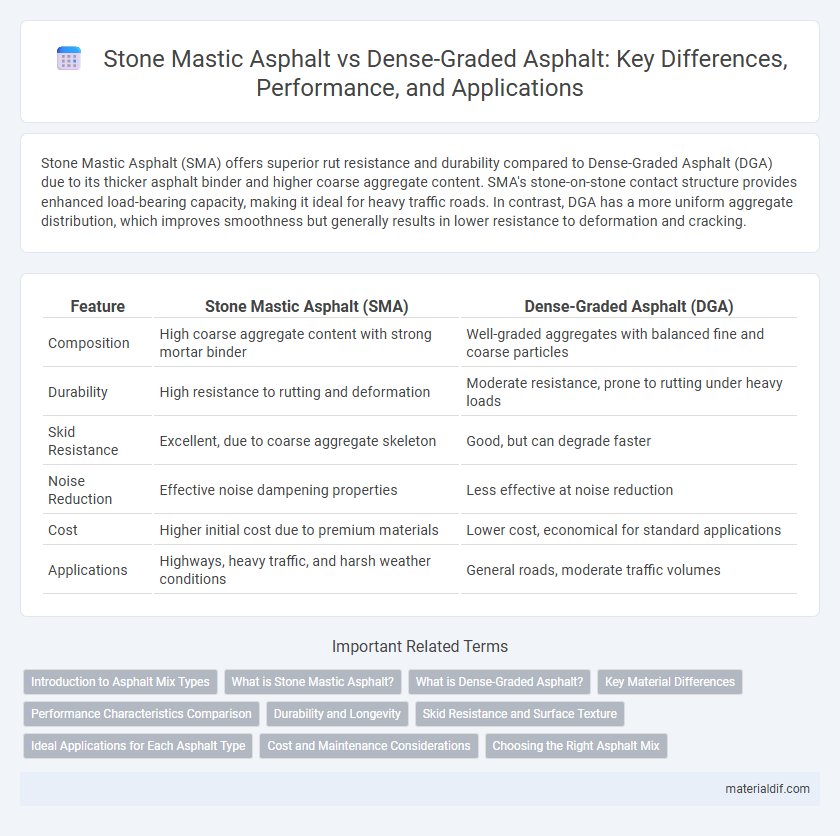Stone Mastic Asphalt (SMA) offers superior rut resistance and durability compared to Dense-Graded Asphalt (DGA) due to its thicker asphalt binder and higher coarse aggregate content. SMA's stone-on-stone contact structure provides enhanced load-bearing capacity, making it ideal for heavy traffic roads. In contrast, DGA has a more uniform aggregate distribution, which improves smoothness but generally results in lower resistance to deformation and cracking.
Table of Comparison
| Feature | Stone Mastic Asphalt (SMA) | Dense-Graded Asphalt (DGA) |
|---|---|---|
| Composition | High coarse aggregate content with strong mortar binder | Well-graded aggregates with balanced fine and coarse particles |
| Durability | High resistance to rutting and deformation | Moderate resistance, prone to rutting under heavy loads |
| Skid Resistance | Excellent, due to coarse aggregate skeleton | Good, but can degrade faster |
| Noise Reduction | Effective noise dampening properties | Less effective at noise reduction |
| Cost | Higher initial cost due to premium materials | Lower cost, economical for standard applications |
| Applications | Highways, heavy traffic, and harsh weather conditions | General roads, moderate traffic volumes |
Introduction to Asphalt Mix Types
Stone Mastic Asphalt (SMA) features a gap-graded aggregate structure with a high coarse aggregate content and a rich mortar binder that enhances durability and rut resistance, making it ideal for high-traffic roads. Dense-Graded Asphalt (DGA) utilizes a well-graded aggregate blend with a balanced distribution of particle sizes, providing a smooth surface and good load distribution for general pavement applications. The choice between SMA and DGA depends on performance requirements, with SMA offering superior deformation resistance and DGA delivering cost-effective versatility.
What is Stone Mastic Asphalt?
Stone Mastic Asphalt (SMA) is a durable surface layer consisting of a gap-graded aggregate matrix with a high coarse aggregate content, bound by a rich mastic of bitumen and filler. Its stone-on-stone contact structure enhances deformation resistance and skid resistance, making it ideal for high-traffic roads and heavy load conditions. SMA also incorporates fibers or stabilizers to prevent bitumen drainage and improve longevity compared to Dense-Graded Asphalt.
What is Dense-Graded Asphalt?
Dense-graded asphalt is a pavement mixture characterized by a well-graded aggregate distribution that ensures minimal voids and maximum density, enhancing durability and load-bearing capacity. This type of asphalt combines varying sizes of crushed stone and filler materials to create a strong, stable pavement surface suited for high-traffic roads. Its balanced composition improves resistance to deformation and water infiltration compared to gap-graded or porous mixtures.
Key Material Differences
Stone Mastic Asphalt (SMA) features a coarse aggregate skeleton with a high bitumen content and fiber reinforcement, enhancing durability and deformation resistance. Dense-Graded Asphalt (DGA) consists of a well-graded mix of fine and coarse aggregates, providing a more compact and watertight structure. The key material difference lies in SMA's gap-graded aggregate structure and binder-rich matrix versus DGA's continuous grading for strength and flexibility.
Performance Characteristics Comparison
Stone Mastic Asphalt (SMA) exhibits superior rut resistance and durability due to its coarse aggregate skeleton and high binder content, making it ideal for heavy traffic roads. Dense-Graded Asphalt (DGA) offers better compaction and smoother surface texture but typically presents lower resistance to deformation under load. SMA's gap-graded structure enhances resistance to fatigue cracking and moisture damage compared to the more uniform texture of DGA.
Durability and Longevity
Stone Mastic Asphalt (SMA) offers superior durability and longevity compared to Dense-Graded Asphalt (DGA) due to its high stone content and rich mortar binder, which enhance resistance to rutting and cracking. SMA's interconnected coarse aggregate skeleton provides excellent load-bearing capacity, making it ideal for heavy traffic conditions and extending pavement life significantly. In contrast, Dense-Graded Asphalt has a more uniform aggregate distribution that may be prone to deformation and oxidation over time, resulting in shorter service life under similar stress conditions.
Skid Resistance and Surface Texture
Stone Mastic Asphalt (SMA) offers superior skid resistance due to its coarse aggregate skeleton and polymer-modified binder, providing a rougher surface texture that improves tire grip. Dense-Graded Asphalt (DGA) has a more uniform aggregate gradation, resulting in a smoother surface with lower skid resistance compared to SMA. The open-graded structure of SMA enhances water drainage, reducing hydroplaning risks and maintaining better traction in wet conditions.
Ideal Applications for Each Asphalt Type
Stone Mastic Asphalt (SMA) is ideal for high-traffic roads and heavy axle loads due to its superior rut resistance and durability. Dense-Graded Asphalt (DGA) suits urban streets and light to moderate traffic, offering excellent smoothness and ease of maintenance. Selecting between SMA and DGA depends on traffic intensity, load conditions, and required pavement lifespan for optimal performance.
Cost and Maintenance Considerations
Stone Mastic Asphalt typically incurs higher initial costs compared to Dense-Graded Asphalt due to specialized materials and production techniques. Maintenance for Stone Mastic Asphalt is generally less frequent and less costly over time, as its rut-resistant composition offers enhanced durability and reduced surface deformation. Dense-Graded Asphalt requires more routine upkeep to address cracking and rutting, which can increase long-term maintenance expenses despite its lower upfront cost.
Choosing the Right Asphalt Mix
Stone Mastic Asphalt (SMA) offers superior rut resistance and durability due to its high coarse aggregate content and binder-rich mortar, making it ideal for heavy traffic and high-stress pavements. Dense-Graded Asphalt (DGA) provides a more economical solution with balanced aggregate sizes, suitable for moderate traffic volumes and general roadway applications. Selecting the right asphalt mix depends on traffic load, climate conditions, and project lifespan requirements to achieve optimal pavement performance and maintenance efficiency.
Stone Mastic Asphalt vs Dense-Graded Asphalt Infographic

 materialdif.com
materialdif.com